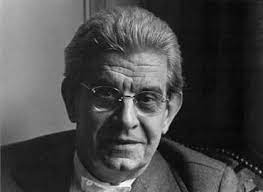Lacan, Jacques

Bio: (1901–1981) French psychoanalyst and psychiatrist. Jacques Lacan studied medicine at the University of Paris, after that he specialized in psychiatry, and in 1932 completed his doctoral thesis on paranoia. Lacan started treating patients at the Sainte-Anne Hospital, but, in addition to that, in 1936 he began his private psychoanalytic practice. Lacan and many colleagues left the official French psychoanalytic society (Société Parisienne de Psychanalyse) in 1953. This group formed the new institution named Société Française de Psychanalyse. In 1964 Lacan broke with the International Psychoanalytical Association and founded École Freudienne de Paris (EFP), where he was the sole director because it was dissolved in 1980.
Freud and his psychoanalysis had the greatest influence on Lacan's approach to psychiatry, but he was also influenced by various scientific, artistic, and philosophical movements and ideas: French psychiatry, phenomenological psychology (Eugène Minkowski, Ludwig Binswanger, and Karl Jaspers), psychiatric ideas of Gaëton Gatian de Clérambault, philosophies of G. W. F. Hegel, Martin Heidegger, and Henri Bergson, the teaching of the Marxist political philosopher Alexander Kojève, ideas of Rudolph Loewenstein, and the surrealist's ideas.
The unconscious is structured as a language, in Saussure's meaning of language as a system of signs (signifier and signified), whereby Lacan emphasizes speech acts (signifier). Accordingly, the subject is formed through and in language, while the mind represents a connection of associations and substitutions. The subject as a baby accepts the mother's speech signifiers as his own, although they initially act as an Other in relation to him. By acquiring the mother's (Foreign) language, a person is forced to learn to express needs and feelings through language. Lacan draws a parallel between Jakobson's linguistic terms "metaphor" and "metonymy" and Freud's terms "condensation" and "displacement". Even all the types of „Defective“ linguistic communication is significant for Lacan.
In Lacan’s psychoanalytic theory, the subject constitutes a trilogy of orders. These orders are: „Real“, „Imaginary“, and „Symbolic“. Imaginary represents the discourse of everyday life, and on this level effects of the unconscious are not acknowledged. In the Imaginary subject mis-recognises the nature of the Symbolic, because the subject sees the Symbolic as transparent and realistic. Imaginary represents the area of „necessary illusions“. The Real, per Lacan, is always „in its place“. The Symbolic represents the substitute for what is absent from the Real.
The „Mirror Stage“ is theoretically very important for Lacan because it represents the emergence, in 6 – 18 months old infants, of the capacity to recognize their own image. This recognition is significant because the infant has to recognize the image as itself, but also as not itself, and only as a reflection. The mirror is a part of the Imaginary.
A child forms his own identity when the father (agent of the father principle) interrupts the mother-child relationship. The mother’s place (feminine) tends to be the Real, the father represents the Symbolic, and the child is Imaginary. That is, the child builds his or her identity by accepting sexual differences. Sexual differentiation starts with the realization that the mother lacks a penis (mark of difference). Lacan names the symbolic meaning of the penis „phallus“. While the penis is real, the phallus becomes a symbolic signifier of what is missing. The Symbolic makes the child confront its vulnerability and mortality, which is symbolically represented by the fear of castration. Through this Symbolic gives the world (society) law and meaning.
Theoretical approaches
PsychoanalysisFields of research
Body Children Communication Everyday Life Family Language Law Psychology Sex Sign and SymbolMain works
The Seminar, 25 vols. (1952-1980);
Écrits (1966).

